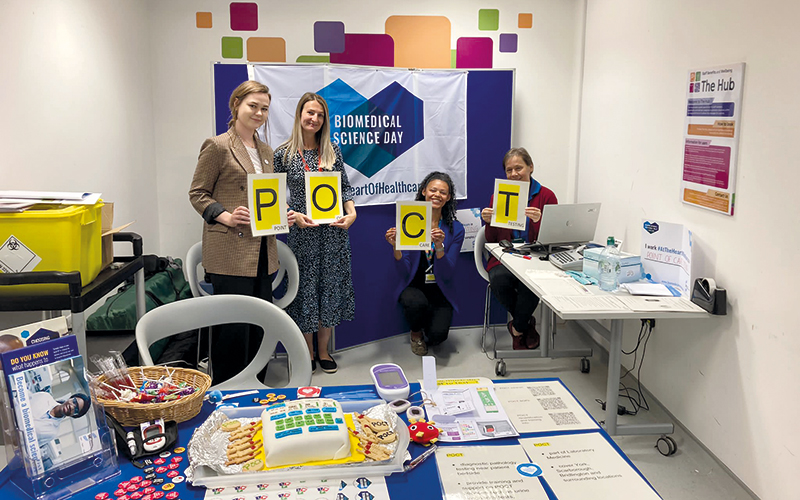Clemora Wilkinson gives a guided tour of the rapidly expanding Point-of-Care Testing department of York and Scarborough Hospitals.

Point-of-care testing (POCT) used to be the little sister of biochemistry departments – a diagnostic testing service often run by willing biomedical scientists from the main blood sciences laboratory, usually consisting of a couple of blood gas analysers. We have come a long way since then and POCT has become a highly efficient multi-disciplinary department of its own, enabling innovative, effective patient-centred care close to the patient.
We cover POCT across our trust, including satellite sites as well as some community services. Our services include blood gas analysers, glucose and ketone meters, urinalysis, pregnancy and HIV tests and COVID-19/influenza analysers, as well as many smaller more specialised services, such as ACT-LR and foetal fibronectin.
With the quality of testing of high importance to us, one of our big tasks is external quality control (EQA). With 198 connected hospital glucose meters and 235 non-connected community glucose meters, you can imagine the time taken to send out EQA samples and chase staff for results to be returned. However, with the POCT team’s hard work, in July we managed to achieve 100% returns from the hospital and 99% from our community – something we’re really proud of and that couldn’t be done without the input and understanding of our end users. It was proof of a good-quality testing service.
As our end users are not laboratory staff, one of our major tasks includes operator training. We must ensure that each user is appropriately trained to ensure valid, quality results. Training covers everything from sample taking and pre-analytics to troubleshooting.
POCT is a link between the lab and the rest of the hospital as we have close and personal communication with staff out on the wards. We feel this a privileged position to be in; we both promote the work of the laboratory and scientists caring for patients more indirectly, while having a unique insight into the clinical staff world caring directly for our patients. Building good rapport between the labs and the rest of the trust it vital.
One of the things we’ve been working hard on in the background is visibility amongst our peers and beyond. We want everyone to know about POCT – the department and the scientists. So, this year we got involved in IBMS Biomedical Science Day 2023. We made a blood gas analyser cake and created POCT consumable artwork. It was a great opportunity for hospital staff to approach us and learn more about what we do.
Although we’re still a relatively small team of specialist biomedical scientists, senior biomedical scientists as POCT coordinators, and healthcare science support staff, we’re growing rapidly. Following on from NHS England guidance for healthcare away from the hospital and the new National POCT Guidance 2023 published with collaboration between the IBMS, RCPath and ACB, we are taking the opportunity to promote our fast-paced, fast-growing POCT workforce and encourage you to seek out and support your laboratory’s POCT team.
We are incredibly proud of what our team continues to achieve. POCT is #AtTheHeartOfHealthcare.
Clemora Wilkinson is a Senior Biomedical Scientist and POCT Coordinator at York and Scarborough Hospitals, which is part of Scarborough, Hull and York Pathology Service.




